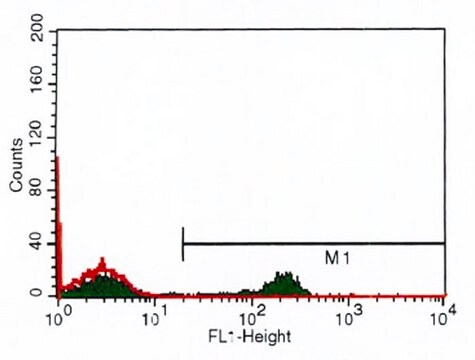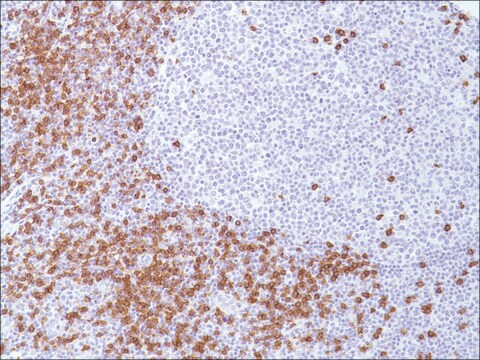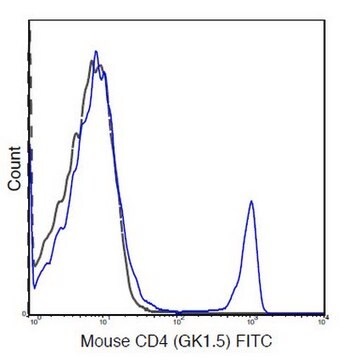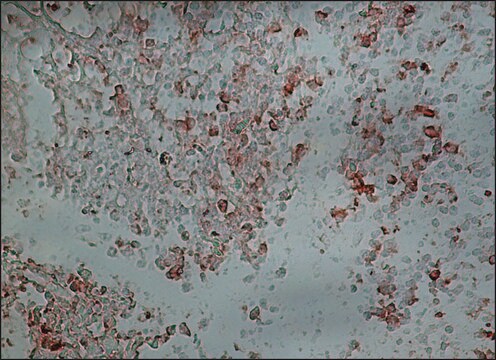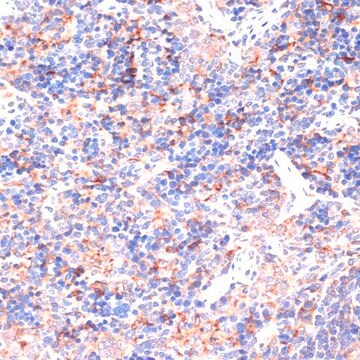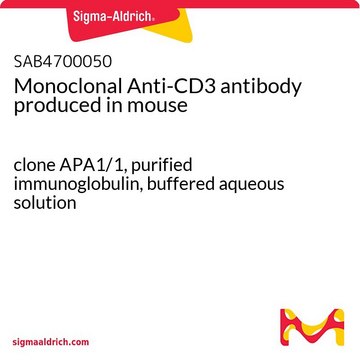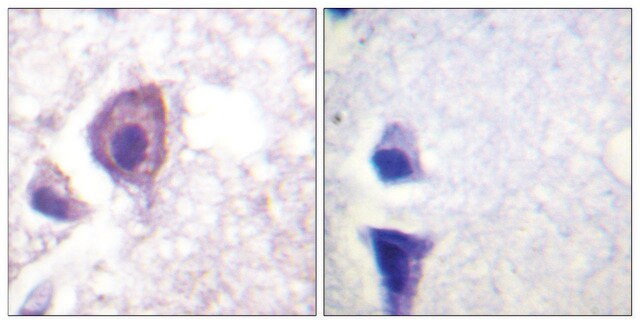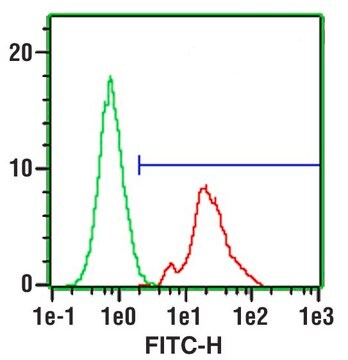SAB5500064
Anti-CD4 antibody, Rabbit monoclonal
recombinant, expressed in proprietary host, clone SP35, affinity isolated antibody
Sinonimo/i:
Anti-CD4mut, Anti-IMD79, Anti-OKT4D
Autenticatiper visualizzare i prezzi riservati alla tua organizzazione & contrattuali
About This Item
Codice UNSPSC:
12352203
NACRES:
NA.41
Prodotti consigliati
Origine biologica
rabbit
Livello qualitativo
Ricombinante
expressed in proprietary host
Coniugato
unconjugated
Forma dell’anticorpo
affinity isolated antibody
Tipo di anticorpo
primary antibodies
Clone
SP35, monoclonal
Reattività contro le specie
human (tested)
Reattività contro le specie (prevista in base all’omologia)
pig
tecniche
flow cytometry: 1:100
immunohistochemistry: 1:50
Isotipo
IgG
N° accesso UniProt
Condizioni di spedizione
wet ice
Temperatura di conservazione
2-8°C
modifica post-traduzionali bersaglio
unmodified
Informazioni sul gene
human ... CD4(920)
Descrizione generale
CD4, a single chain transmembrane glycoprotein, is found on a T cell subset (helper/inducer) representing 45% of peripheral blood lymphocytes. It is also present on 80% of thymocytes and at a lower level on monocytes. It is involved in recognition of antigen presented along with MHC class II by APCs. It serves as receptor for HIV and is expressed in T cell lymphomas. Non-specific nuclear staining is sometimes seen in follicles with this antibody; however in most cases it does not interfere with the interpretation of the CD4 membrane staining.
Immunogeno
Synthetic peptide corresponding to internal region of human CD4.
Caratteristiche e vantaggi
Evaluate our antibodies with complete peace of mind. If the antibody does not perform in your application, we will issue a full credit or replacement antibody. Learn more.
Stato fisico
0.1 ml rabbit monoclonal antibody purified by protein A/G in PBS/1% BSA buffer pH 7.6 with less than 0.1% sodium azide.
Esclusione di responsabilità
Unless otherwise stated in our catalog or other company documentation accompanying the product(s), our products are intended for research use only and are not to be used for any other purpose, which includes but is not limited to, unauthorized commercial uses, in vitro diagnostic uses, ex vivo or in vivo therapeutic uses or any type of consumption or application to humans or animals.
Non trovi il prodotto giusto?
Prova il nostro Motore di ricerca dei prodotti.
Codice della classe di stoccaggio
10 - Combustible liquids
Classe di pericolosità dell'acqua (WGK)
WGK 2
Punto d’infiammabilità (°F)
Not applicable
Punto d’infiammabilità (°C)
Not applicable
Scegli una delle versioni più recenti:
Possiedi già questo prodotto?
I documenti relativi ai prodotti acquistati recentemente sono disponibili nell’Archivio dei documenti.
Chronic hepatitis C liver microenvironment: role of the Th17/Treg interplay related to fibrogenesis.
Daniela Alejandra Rios et al.
Scientific reports, 7(1), 13283-13283 (2017-10-19)
The role of the different lymphocyte populations in liver microenvironment of chronic hepatitis C (CHC) patients is still matter of debate. Since Th17 and Treg have opposite functions, their balance could affect disease progression. The aim was to explore liver
Julie Jacobs et al.
Oncoimmunology, 7(7), e1440167-e1440167 (2018-06-15)
Cancer-associated fibroblasts (CAFs) are involved in the proliferative and invasive behavior of colorectal cancer (CRC). Nonetheless, CAFs represent a heterogeneous population with both cancer-promoting and cancer-restraining actions, lacking specific markers to target them. Expression of the immune checkpoint molecule CD70
Akihiro Kitadate et al.
Haematologica, 103(1), 126-135 (2017-10-14)
Histone deacetylase inhibitors are promising agents for various T-cell lymphomas, including cutaneous T-cell lymphoma, peripheral T-cell lymphoma, and adult T-cell lymphoma/leukemia. CCR4 is an important therapeutic target molecule because mogamulizumab, an anti-CCR4 antibody, has shown promising efficacy against various T-cell
Kazuhiko Hashimoto et al.
European journal of histochemistry : EJH, 65(3) (2021-07-06)
Inhibitors of the programmed death-1/programmed death-ligand 1 (PD-1/PD-L1) immune checkpoint system are used for treating various malignancies. However, evidence on their use in soft tissue sarcomas (STS) is limited. This study aimed to retrospectively investigate the relationship between the expression
Thomas Albrecht et al.
Cancers, 13(7) (2021-05-01)
Inhibition of the programmed cell death protein-1/ligand-1 (PD-1/PD-L1) axis has opened a new era in the treatment of solid cancers. However, there is no data on the expression and relevance of PD-L1 in Western gallbladder cancer (GBC). We assessed PD-L1
Il team dei nostri ricercatori vanta grande esperienza in tutte le aree della ricerca quali Life Science, scienza dei materiali, sintesi chimica, cromatografia, discipline analitiche, ecc..
Contatta l'Assistenza Tecnica.
